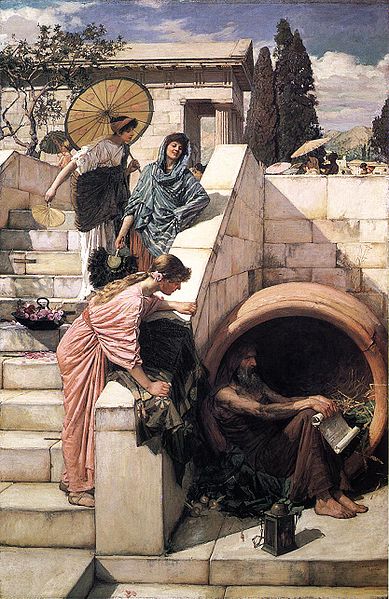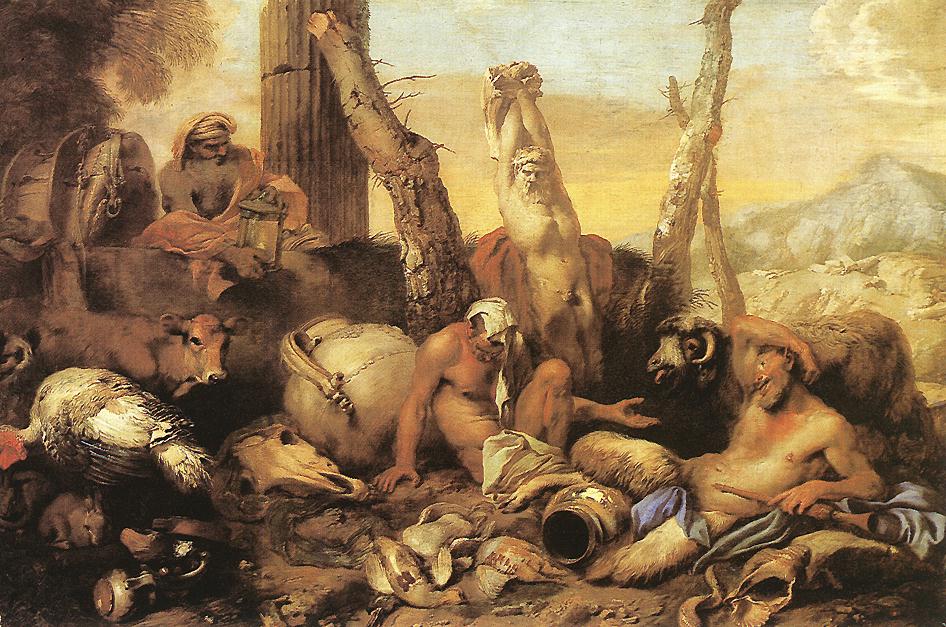Lying on the bare earth, shoeless, bearded, half naked, he looked like a beggar or a lunatic. He was one, but not the other. He had opened his eyes with the sun at dawn, scratched, done his business like a dog at the roadside, washed at the public fountain, begged a piece of breakfast bread and a few olives, eaten them squatting on the ground, and washed them down with a few handfuls of water scooped from the spring. Long ago, he had owned a rough wooden cup, but he threw it away when he saw a boy drinking out of his hollowed hands….

Read More:http://penelope.uchicago.edu/~grout/encyclopaedia_romana/greece/hetairai/diogenes.html ---Why do people give to beggars, he was asked, but not to philosophers? "Because they think they may one day be lame or blind, but never expect that they will turn to philosophy." To a young man who complained that he was ill suited to study philosophy, Diogenes said "Why then do you live, if you do not care to live well?" Of grammarians, he was astonished that they desire to learn everything about the misfortunes of Odysseus but nothing about their own. Of mathematicians, that they keep their eyes on the heavens and overlook what is at their feet. When asked why he alone praised an indifferent harp player, Diogenes replied "because he plays the harp and does not steal." When asked what wine he found most pleasant to drink, Diogenes replied, "That for which other people pay." Once, eating some dried figs, he offered some to Plato, which prompted Diogenes to remonstrate "I said that you might have a share of them, not that you might eat them all.---painting by JW Waterhouse.
Having no work to go to and no family to provide for, he was free. As the market place filled up with shoppers and merchants and gossipers and sharpers and slaves and foreigners, he had strolled through it for an hour or two. Everybody knew him, or knew of him.They would throw sharp questions at him, and get sharper answers. Sometimes they threw jeers, and got jibes; sometimes bits of food, and got scant thanks.; sometimes a mischievous pebble, and got a shower of stones and abuse. They were not quite sure whether he was mad or not. But he knew they were mad, all mad, each in a different way; they amused him. Now he was back at his home.

Read More:http://millionsofmouths.com/diogenes.html ---After being reproached for masturbating in the marketplace he would say "If only it was as easy to banish hunger by rubbing the belly as it is to masturbate." Dio Chrysostom described Diogenes as terminating a discourse by squatting down and evacuating his bowels in the presence of his hearers. After being captured by pirates, Diogenes was asked what he can do and he replied "I can govern men; therefore sell me to one who wants a master." Then as a slave, Diogenes said, "You must obey me, although I am a slave; for, if a physician or a steersman were in slavery, he would be obeyed."---
It was not a house, not even a squatter’s hut. He thought everybody lived far to elaborately, expensively,anxiously. What good is a house? No one needs privacy: natural acts are not shameful; we all do the same things, and need not hide them. No one needs beds and chairs and such furniture: the animals live healthy lives and sleep on the ground. All we require,since nature did not dress us properly, is one garment to keep us warm, and some shelter from rain and wind. So he had one blanket- to dress him in the daytime and cover him at night- and he slept in a cask. A cask. His name was Diogenes. He was the founder of the creed called Cynicism, which means “doggishness” ; he spent much of his life in the rich and corrupt city of Corinth, mocking and satirizing its people, and occasionally converting one of them.
His home was not a barrel made of wood. To expensive. It was a storage jar made of earthenware, something like a modern fuel tank, no doubt discarded because a break had made it useless. He was not the first to inhabit such a thing: the refugees driven into Athens by the Spartan invasion had been forced to sleep in casks. But he was the first who ever did so by choice, out of principle.

Read More:http://2ndlook.wordpress.com/2008/08/07/hannibals-elephants/ ---Diogenes has a snug wooden barrel and Alexander a surprisingly gray beard for one so young, he was only twenty, in this version of their encounter from a fifteenth-century French manuscript. ---
Diogenes was not a degenerate or a maniac. He was a philosopher who wrote plays and poems and essays expounding his doctrine; he talked to those who cared to listen; he had pupils who admired him.But he taught chiefly by example. All should live naturally, he said, for what is natural and normal cannot possibly be evil or shameful. Live without conventions,which are artificial and false; escape complexities and superfluities and extravagances: only so can you live a free life. The rich man believes he possesses his big house with its many rooms and its elaborate furniture, his pictures and his expensive clothes, his horses and his servants and his bank accounts. ….
ADDEND
/p>
( see link at end) …When Alexander the Great went to Corinth, all the foremost men in the city came out to see him and to praise him. But Diogenes did not come; and he was the only man for whose opinions Alexander cared.
And so, since the wise man wonld not come to see the king, the king went to see the wise man. He found Diogenes in an out-of-the-way place, lying on the ground by his tub. He was enjoying the heat and the light of the sun.
When he saw the king and a great many people coming, he sat up and looked at Alexander. Alexander greeted him and said,—
“Diogenes, I have heard a great deal about your wisdom. Is there anything that I can do for you?”
“Yes,” said Diogenes. “You can stand a little on one side, so as not to keep the sunshine from me.”
This answer was so different from what he expected, that the king was much surprised. But it did not make him angry; it only made him admire the strange man all the more. When he turned to ride back, he said to his officers,—
“Say what you will; if I were not Alexander, I would like to be Diogenes.” Read More:http://www.mainlesson.com/display.php?author=baldwin&book=fifty&story=diogenes








 COMMENTS
COMMENTS



